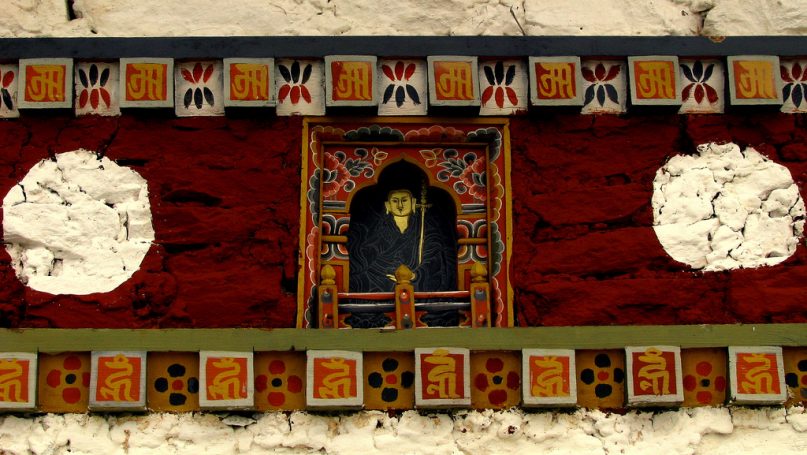
March 2015 was the prime stage for the 2018 World Cup opening qualifiers. Among the many countries that battled for a place in the second round was the Himalayan Kingdom of Bhutan. The Kingdom’s football team is arguably the worst football team to be recognised by FIFA, ranked dead last in 209th place. As the first football match between Bhutan and Sri Lanka kicked off, no-one expected Bhutan to win. This was not only due to its poor ranking but also in light of the limited number of matches the team has played recently. Furthermore, the Bhutanese football team has only won four football games in the last 33 years and the painful 20-0 defeat they experienced in Kuwait during the Asian Cup qualifier in 2000 is still engraved into the minds of Bhutan’s supporters. It is little wonder that no-one gave Bhutan a chance in their first ever World Cup qualifier.
The Bhutan captain, however, viewed the situation in a more positive light and he said that ‘we can only go one way from there and that is upwards.’ And upwards the Bhutanese team went as they unexpectedly won the first round of the 2018 World Cup qualifiers. During the second and decisive match, the Bhutanese team scored ‘on five minutes and struck the winning goal in the 90th minute.’ Reacting to Bhutan’s unanticipated victory, the captain of the Bhutanese team uttered that ‘all the expectation was on Sri Lanka and they were talking a lot about beating us, but we kept our calm and let our football talk for us.’ Bhutan’s football performance indeed talked for them, if not more. In no time, the victorious news spread like wildfire around the globe. It was headline news in regional and global newspapers.
But beyond the sporting upset element, why might this story be important to world politics? I argue that it can serve as an analogy for Bhutan’s presence in the international community. States are usually categorized according to their size, population, landmass, economy or military capabilities. Within this ranking system, it is assumed that states at the top of the list are (more) able to shape global outcomes in line with their preferences. The question, however, remains whether size matters and when it matters? Bhutan is home to a population of approximately 745,153; its landmass amounts to 38,394 square kilometres; it is categorized as a lower-middle-income-country; and its army only employs about 8,000 soldiers—a fact I learned from interviewing Yeshey Zimba, former Minister of Works and Human Settlement in 2011. However, Bhutan challenges the maxim of Thucydides that ‘the strong do what they have the power to do and the weak accept what they have to accept.’ Unable to rely on traditional power capabilities, Bhutan has let its soft power speak.
Besides being home to the worst football team in the world, Bhutan is also home to a unique development philosophy called Gross National Happiness (GNH). In an interview I conducted in 2009 with Jigme Y. Thinley, the former Prime Minister of Bhutan, he indicated that GNH emphasises a balance between material well-being and the spiritual needs of the mind. Just like Bhutan’s victory in the World Cup, GNH spread like wildfire around the globe upon its introduction. GNH has been adopted by state and non-state actors as well as by international organisations such as the United Nations. On the 19th of July 2011, the United Nations adopted (without a vote) resolution 65/309: Happiness: towards a holistic approach to development. This resolution states, among other things, that ‘the pursuit of happiness is a fundamental goal’ and that ‘the gross domestic product (GDP) indicator was not designed to, and does not adequately reflect, the happiness and well-being of people in a country.’ Likewise, Ron Colman, Founder and Executive Director of GPIAtlantic indicated when I interviewed him in 2011 that ‘Bhutan matters and GNH matters because the existing system [GDP] is bankrupt, and it is falling apart. GNH is based on knowledge that we have today. It is not something that is just a matter of adding a few nice environmental things. It is the necessary way of development for the 21st century. There is not another one.’
Following the adoption of the GNH resolution, Bhutan took a lead role in defining a new economic paradigm referred to as gross global happiness. Furthermore, during the first UN conference on Happiness, the UN General Assembly adopted a resolution which ‘decreed that an International Day of Happiness would be observed every year on 20 March.’ The resolution states, among other things, that ‘happiness and well-being are universal goals and aspirations in the lives of human beings around the world.’ The first international day of happiness was celebrated in 2013. So just like March 2015 was the prime stage for the 2018 World Cup opening qualifiers, March 20 each year reminds the world that a Himalayan Kingdom, although small in size, has been able to shape the international agenda by offering the world an alternative development philosophy. As such, Bhutan’s international presence is much greater than its size might suggest.
Further Reading on E-International Relations
- Future of Popular Geopolitics: Croatia, Affective Nationalism and the World Cup
- Soft Power: Can Less be More?
- Queen Elizabeth II’s Soft Power and Britain’s Place in a Post-Elizabethan Age
- The State of Japan’s Soft Power After the 2020 Olympics
- Is South Korea the New Quintessential Representation of Soft Power?
- Contextualizing Soft Power’s Analysis: The Value of Attractive National Features